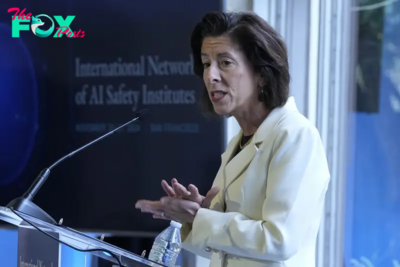US News
Harvard Commencement Speaker Maria Ressa Denies Antisemitism Accusation
Philippine journalist Maria Ressa, a 2021 Nobel Peace Prize recipient who has been recognized as one of TIME’s 2018 Persons of the Year as well as one of the most iNFLuential women of the century for her fight for press freedoms and against disinformation, was announced in March as the deliverer of the principal address at Harvard University’s commencement on May 23.
“Maria Ressa embodies Veritas,” said Harvard interim President Alan Garber at the time, referencing the school’s Latin motto meaning truth. “For nearly 40 years, she has dedicated herself to truth — its pursuit, its advocacy, and its defense — no matter the repercussions.”
While some students initially expressed disappointment that the chosen speaker wasn’t as “fun” as previous speakers, like last year’s Tom Hanks, Ressa’s selection seemed mostly uncontroversial at first. But as college campuses have been roiled by pro-Palestinian protests and accusations of antisemitism in recent months, Ressa has now been accused by a Republican congresswoman and prominent Harvard alum of being antisemitic—an imputation that Ressa categorically denied to TIME on Monday.
Rep. Elise Stefanik of New York, who has led the charge in Congress against Ivy League university administrators over alleged antisemitism on campuses, first criticized the choice on Friday on X, writing: “Harvard chose an antisemitic commencement speaker. The university has failed to stand up for Jewish students at every turn, revealing the depths of its moral delinquency.”
Stefanik included a link to an article by right-leaning news organization Washington Free Beacon, which suggested that a November editorial in Rappler, the Philippine publication Ressa cofounded in 2012 and leads as CEO, likened Israel to Hitler.
Last week, Stefanik was among the majority in the House of Representatives that voted in favor of a bill for the U.S. government to adopt the International Holocaust Remembrance Alliance’s definition of antisemitism, which includes “drawing comparisons of contemporary Israeli policy to that of the Nazis.”
In a statement to TIME, Rappler said that the Free Beacon article misrepresented its editorial, which was published in Filipino. “Rep. Stefanik should get an accurate translation,” said Rappler cofounder and executive editor Glenda M. Gloria. “Rappler’s editorial, published on November 6, 2023, calls for a ceasefire in Gaza, a challenge to humanity that, we believe, is shared by many. We also refuse to be dragged into the binary anti-Semitic vs anti-Palestine argument. There is only one side in this war: the side of peace, the side of truth over propaganda, the side of humanity over weapons and hate.”
The Free Beacon also criticized an open letter that Ressa signed in January by the International Press Institute’s (IPI) global executive board that called for Israel to stop killing journalists. The Free Beacon said that there is no clear evidence that Israel has targeted journalists and alleged that some Palestinians use journalism as a cover for terrorist activities.
Reporters Without Borders announced last week that more than 100 journalists have been killed in Gaza since Oct. 7. The Committee to Protect Journalists counted 97 journalists and media workers, including 2 Israeli journalists, that have been killed in the war, as of May 3. Families of Palestinian journalists killed have rejected Israel’s claims that they were linked to terrorists.
“Since when does calling for an end to journalist killings in Gaza or a ceasefire become antisemitic?!” Ressa told TIME on Monday.
Ressa had just returned from Chile where she gave a keynote address at a World Press Freedom Day conference held by UNESCO over the weekend. There, she spoke about the ways social media and search algorithms promote outrage over engagement with facts: “There are many, many more novel ways of silencing journalists today when free speech is literally used to pound you to silence.” Lies, Ressa has emphasized throughout her career, spread faster than facts.
Stefanik’s tweet and the Free Beacon article appear to feed into such outrage.
“Under Duterte, I was CIA and a communist,” Ressa told TIME, referencing former Philippine President Rodrigo Duterte, whose deadly drug war she famously documented. “Now apparently, I’m antisemitic and a Zionist,” she added, referencing also allegations that she’s insufficiently critical of Israel. “None of these are true, but these lies are distributed, with impunity, by social media. We need accountability.”
Stefanik told TIME in a statement sent after publication: “The moral rot is clear for all to see that even amidst Harvard’s institutional crisis for their failure to condemn antisemitism, Harvard doubled down and chose an antisemitic speaker for Commencement. It is a disgrace.”
Harvard University and IPI did not respond to TIME’s requests for comment.
-

 US News1d ago
US News1d agoHow TIME and Statista Determined the Best Companies and Colleges for Future Leaders for 2025
-

 US News1d ago
US News1d agoWorld’s Best Brands – United States
-

 US News2d ago
US News2d agoFlorida Man Arrested and Charged With Planning to Bomb the New York Stock Exchange
-

 US News2d ago
US News2d agoU.S. Gathers Global Group to Tackle AI Safety Amid Growing National Security Concerns
-

 US News2d ago
US News2d agoTexas Offers Trump Land on U.S.-Mexico Border for Potential Mass Deportations
-

 US News3d ago
US News3d ago4B Is Not the Winning Strategy to Resist the Patriarchy People Think It Is
-

 US News3d ago
US News3d ago‘Bomb Cyclone’ Threatens Northern California and Pacific Northwest
-

 US News3d ago
US News3d agoClimate Action in Trump 2.0
















